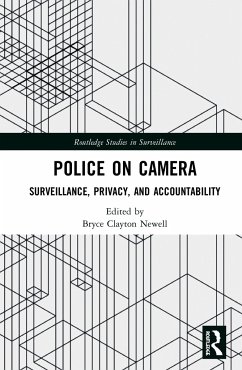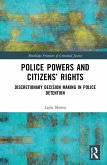Police on Camera
Surveillance, Privacy, and Accountability
Herausgeber: Newell, Bryce Clayton
Police on Camera
Surveillance, Privacy, and Accountability
Herausgeber: Newell, Bryce Clayton
- Gebundenes Buch
- Merkliste
- Auf die Merkliste
- Bewerten Bewerten
- Teilen
- Produkt teilen
- Produkterinnerung
- Produkterinnerung
Police on Camera address the conceptual and empirical evidence surrounding the use of BWCs by police officers in societies around the globe, offering a variety of differing opinions from experts in the field.
Andere Kunden interessierten sich auch für
![Police Powers and Citizens' Rights Police Powers and Citizens' Rights]() Layla SkinnsPolice Powers and Citizens' Rights198,99 €
Layla SkinnsPolice Powers and Citizens' Rights198,99 €![Organizational Change in an Urban Police Department Organizational Change in an Urban Police Department]() Brenda J. Bond-FortierOrganizational Change in an Urban Police Department198,99 €
Brenda J. Bond-FortierOrganizational Change in an Urban Police Department198,99 €![International Perspectives on Police Education and Training International Perspectives on Police Education and Training]() International Perspectives on Police Education and Training231,99 €
International Perspectives on Police Education and Training231,99 €![Performance of Women Police Performance of Women Police]() Mohamed Ali ApPerformance of Women Police41,99 €
Mohamed Ali ApPerformance of Women Police41,99 €![Andragogical Instruction for Effective Police Training Andragogical Instruction for Effective Police Training]() Robert F. VoddeAndragogical Instruction for Effective Police Training126,99 €
Robert F. VoddeAndragogical Instruction for Effective Police Training126,99 €![Handbook of Federal Police and Investigative Agencies Handbook of Federal Police and Investigative Agencies]() Donald TorresHandbook of Federal Police and Investigative Agencies89,99 €
Donald TorresHandbook of Federal Police and Investigative Agencies89,99 €![The Police Function The Police Function]() Arthur WiechmannThe Police Function144,99 €
Arthur WiechmannThe Police Function144,99 €-
-
-
Police on Camera address the conceptual and empirical evidence surrounding the use of BWCs by police officers in societies around the globe, offering a variety of differing opinions from experts in the field.
Hinweis: Dieser Artikel kann nur an eine deutsche Lieferadresse ausgeliefert werden.
Hinweis: Dieser Artikel kann nur an eine deutsche Lieferadresse ausgeliefert werden.
Produktdetails
- Produktdetails
- Verlag: Routledge
- Seitenzahl: 284
- Erscheinungstermin: 19. Oktober 2020
- Englisch
- Abmessung: 240mm x 161mm x 20mm
- Gewicht: 593g
- ISBN-13: 9781138342439
- ISBN-10: 1138342432
- Artikelnr.: 60015312
- Herstellerkennzeichnung
- Libri GmbH
- Europaallee 1
- 36244 Bad Hersfeld
- gpsr@libri.de
- Verlag: Routledge
- Seitenzahl: 284
- Erscheinungstermin: 19. Oktober 2020
- Englisch
- Abmessung: 240mm x 161mm x 20mm
- Gewicht: 593g
- ISBN-13: 9781138342439
- ISBN-10: 1138342432
- Artikelnr.: 60015312
- Herstellerkennzeichnung
- Libri GmbH
- Europaallee 1
- 36244 Bad Hersfeld
- gpsr@libri.de
Bryce Clayton Newell is an Assistant Professor in the School of Journalism and Communication at the University of Oregon. His books include Surveillance, Privacy and Public Space (2019) and Privacy in Public Space (2017; both with Tjerk Timan & Bert-Jaap Koops).
Introduction: The Ayes Have It-Should They? Police Body-Worn Cameras
Section 1: Setting the Stage: Theory and Practice
1. Taking Off the Blinders: A General Framework to Understand How Bodycams
Work
2. Theorizing Police Body-Worn Cameras
3. Reading the Body-Worn Camera as Multiple: A Reconsideration of Entities
as Enactments
Section 2: Accountability and Discretion
4. Can We Count on the Police? Definitional Issues in Considering the
Promise of Body Worn Cameras to Increase Police Accountability
5. The Camera Never Lies? Police Body Worn Cameras and Operational
Discretion
6. Does Surveillance of Officers Lead to De-Policing? A Block Randomized
Crossover Controlled Trial on Body-Worn Cameras in Uruguay
7. Police Body-Worn Cameras in the Canadian Context: Policing's New
Visibility and Today's Expectations for Police Accountability
8. Commentary: Accountability, Discretion, and the Questions We Ask
9. Commentary: Questioning Assumptions of De-Policing and Erasures of Race:
A Rejoinder to Ariel's Study of Camera-Induced Passivity Among Traffic
Police in Uruguay
Section 3: Privacy and Surveillance
10. Not Just about Privacy: Police Body-Worn Cameras and the Costs of
Public Area Surveillance
11. Privacy, Public Disclosure, and Police-Worn Body Camera Footage
12. The Rise of Body-Worn Video Cameras: A New Surveillance Revolution?
13. Commentary: A Republican and Collective Approach to the Privacy and
Surveillance Issues of Bodycams
14. Commentary: Protecting the Rights of Citizens on Camera: Why
Restricting Disclosure of Police Body Camera Footage is Better than Giving
Victims Control over Recording
Conclusion: Body Worn Cameras, Surveillance, and Police Legitimacy
Section 1: Setting the Stage: Theory and Practice
1. Taking Off the Blinders: A General Framework to Understand How Bodycams
Work
2. Theorizing Police Body-Worn Cameras
3. Reading the Body-Worn Camera as Multiple: A Reconsideration of Entities
as Enactments
Section 2: Accountability and Discretion
4. Can We Count on the Police? Definitional Issues in Considering the
Promise of Body Worn Cameras to Increase Police Accountability
5. The Camera Never Lies? Police Body Worn Cameras and Operational
Discretion
6. Does Surveillance of Officers Lead to De-Policing? A Block Randomized
Crossover Controlled Trial on Body-Worn Cameras in Uruguay
7. Police Body-Worn Cameras in the Canadian Context: Policing's New
Visibility and Today's Expectations for Police Accountability
8. Commentary: Accountability, Discretion, and the Questions We Ask
9. Commentary: Questioning Assumptions of De-Policing and Erasures of Race:
A Rejoinder to Ariel's Study of Camera-Induced Passivity Among Traffic
Police in Uruguay
Section 3: Privacy and Surveillance
10. Not Just about Privacy: Police Body-Worn Cameras and the Costs of
Public Area Surveillance
11. Privacy, Public Disclosure, and Police-Worn Body Camera Footage
12. The Rise of Body-Worn Video Cameras: A New Surveillance Revolution?
13. Commentary: A Republican and Collective Approach to the Privacy and
Surveillance Issues of Bodycams
14. Commentary: Protecting the Rights of Citizens on Camera: Why
Restricting Disclosure of Police Body Camera Footage is Better than Giving
Victims Control over Recording
Conclusion: Body Worn Cameras, Surveillance, and Police Legitimacy
Introduction: The Ayes Have It-Should They? Police Body-Worn Cameras
Section 1: Setting the Stage: Theory and Practice
1. Taking Off the Blinders: A General Framework to Understand How Bodycams
Work
2. Theorizing Police Body-Worn Cameras
3. Reading the Body-Worn Camera as Multiple: A Reconsideration of Entities
as Enactments
Section 2: Accountability and Discretion
4. Can We Count on the Police? Definitional Issues in Considering the
Promise of Body Worn Cameras to Increase Police Accountability
5. The Camera Never Lies? Police Body Worn Cameras and Operational
Discretion
6. Does Surveillance of Officers Lead to De-Policing? A Block Randomized
Crossover Controlled Trial on Body-Worn Cameras in Uruguay
7. Police Body-Worn Cameras in the Canadian Context: Policing's New
Visibility and Today's Expectations for Police Accountability
8. Commentary: Accountability, Discretion, and the Questions We Ask
9. Commentary: Questioning Assumptions of De-Policing and Erasures of Race:
A Rejoinder to Ariel's Study of Camera-Induced Passivity Among Traffic
Police in Uruguay
Section 3: Privacy and Surveillance
10. Not Just about Privacy: Police Body-Worn Cameras and the Costs of
Public Area Surveillance
11. Privacy, Public Disclosure, and Police-Worn Body Camera Footage
12. The Rise of Body-Worn Video Cameras: A New Surveillance Revolution?
13. Commentary: A Republican and Collective Approach to the Privacy and
Surveillance Issues of Bodycams
14. Commentary: Protecting the Rights of Citizens on Camera: Why
Restricting Disclosure of Police Body Camera Footage is Better than Giving
Victims Control over Recording
Conclusion: Body Worn Cameras, Surveillance, and Police Legitimacy
Section 1: Setting the Stage: Theory and Practice
1. Taking Off the Blinders: A General Framework to Understand How Bodycams
Work
2. Theorizing Police Body-Worn Cameras
3. Reading the Body-Worn Camera as Multiple: A Reconsideration of Entities
as Enactments
Section 2: Accountability and Discretion
4. Can We Count on the Police? Definitional Issues in Considering the
Promise of Body Worn Cameras to Increase Police Accountability
5. The Camera Never Lies? Police Body Worn Cameras and Operational
Discretion
6. Does Surveillance of Officers Lead to De-Policing? A Block Randomized
Crossover Controlled Trial on Body-Worn Cameras in Uruguay
7. Police Body-Worn Cameras in the Canadian Context: Policing's New
Visibility and Today's Expectations for Police Accountability
8. Commentary: Accountability, Discretion, and the Questions We Ask
9. Commentary: Questioning Assumptions of De-Policing and Erasures of Race:
A Rejoinder to Ariel's Study of Camera-Induced Passivity Among Traffic
Police in Uruguay
Section 3: Privacy and Surveillance
10. Not Just about Privacy: Police Body-Worn Cameras and the Costs of
Public Area Surveillance
11. Privacy, Public Disclosure, and Police-Worn Body Camera Footage
12. The Rise of Body-Worn Video Cameras: A New Surveillance Revolution?
13. Commentary: A Republican and Collective Approach to the Privacy and
Surveillance Issues of Bodycams
14. Commentary: Protecting the Rights of Citizens on Camera: Why
Restricting Disclosure of Police Body Camera Footage is Better than Giving
Victims Control over Recording
Conclusion: Body Worn Cameras, Surveillance, and Police Legitimacy








